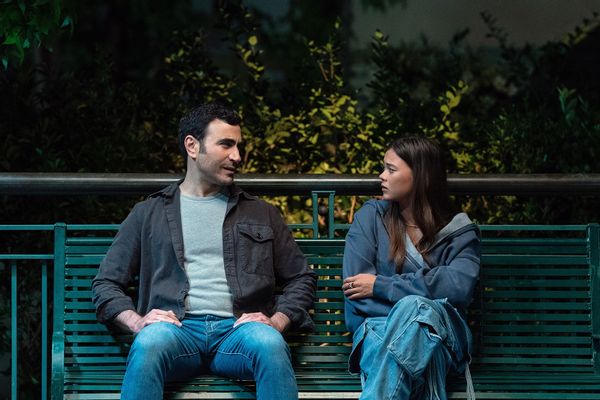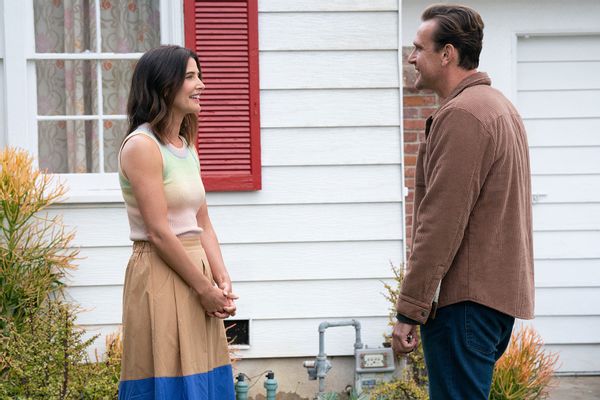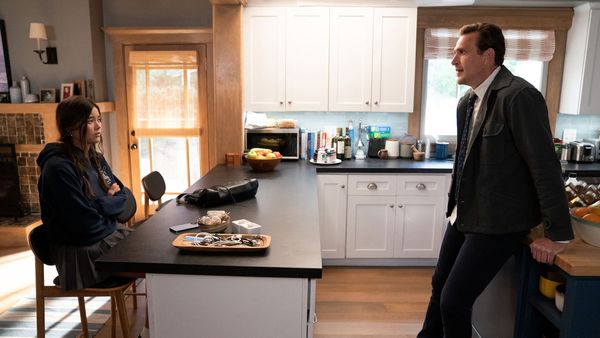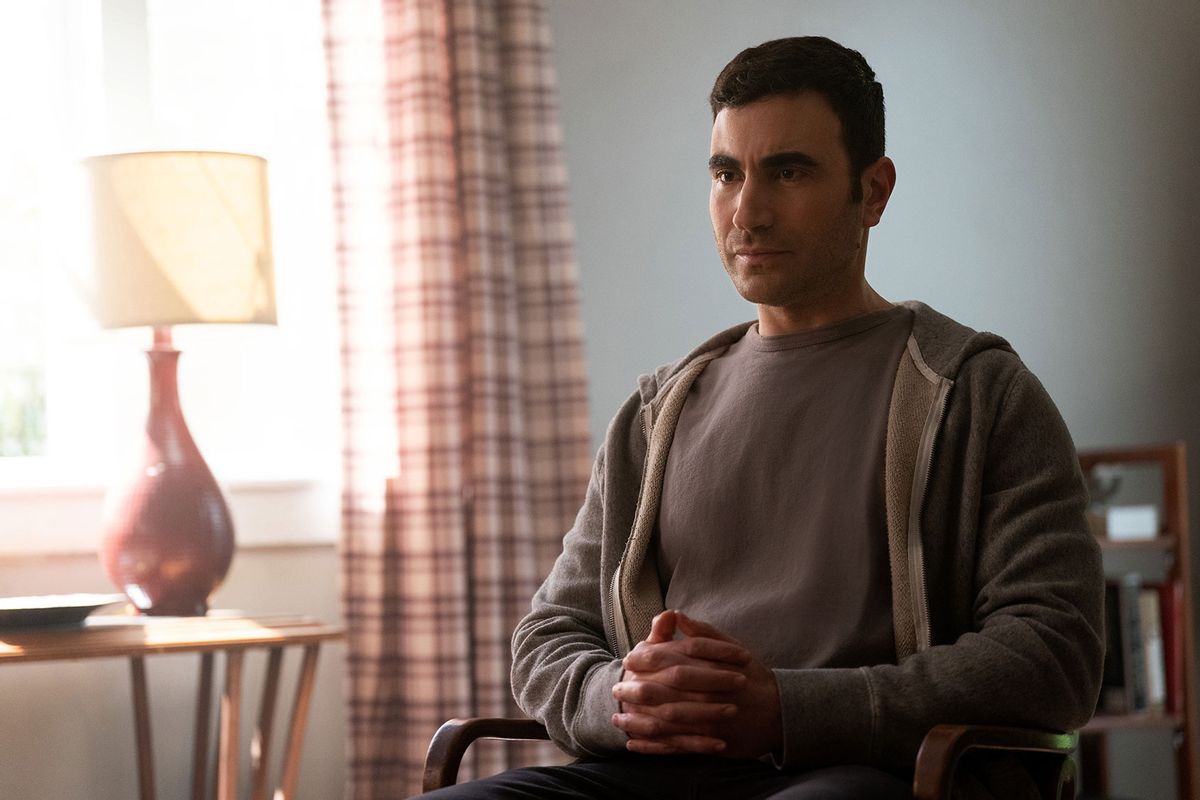Louis Winston’s contribution to “Shrinking” begins like so many of us watching, with a rearview glimpse at his fortunate life. Each day he and his fiancée Sarah would sit on a bench at the South Pasadena train stop and make up ridiculous stories about strangers, transforming average passers-by into assassins and cowboys.
One night shortly after they moved in together, they leave a restaurant after dinner and drinks with friends. Sarah suggests they call a rideshare. Louis, played by Brett Goldstein, insists he’s fine to drive. Louis looks capable as they drive away, completing another frame in this sweet relationship slideshow. Sarah even jokes that he’s definitely going to get laid.
Since this scene plays more than halfway through the second season in an episode called “Last Drink,” we recognize this as the bleakest version of “famous last words.” Louis caused the car crash that killed the wife of Jimmy Laird (Jason Segel), robbing his teen daughter Alice (Lukita Maxwell) of her mother.
The same crash effectively ends Louis’ old life, too. He pushes Sarah away and sentences himself to a lonely existence, restarting his life as a barista. Eventually, he takes it upon himself to apologize to the Lairds face to face – first to Jimmy then, somewhat compulsively, to Alice. Each reacts with explosive anger. But it looks like Louis desperately wants to both express his genuine remorse and offer himself to Jimmy and Alice as rage target.
Goldstein co-created “Shrinking” alongside Segel and Bill Lawrence, but he’s primarily familiar to American audiences as the gruff Roy Kent from Lawrence’s other Apple TV+ plus hit “Ted Lasso.” His role was shrouded in secrecy until the second season premiere revealed he's playing the man who accidentally ruined Jimmy's life. Seeing Goldstein, an actor closely associated with a scruffy romantic lead, portray a tender crushed soul with heartbreaking plausibility feels cognitively dissonant at first, even though Lawrence has said in interviews that Louis more closely resembles the actor’s true temperament.
 Brett Goldstein and Lukita Maxwell in "Shrinking" (Apple TV+)
Brett Goldstein and Lukita Maxwell in "Shrinking" (Apple TV+)
Forgiveness can be a one-person endeavor, but anger and sorrow aren’t faucets that turn off with a pardon.
The audience’s demonstrative empathy for Louis, though, is as much a credit to the writing as Goldstein’s performance. Together they make a thoughtfully conceived and composed character into a narrative impetus not usually seen in stories about grief and healing, and there are precious few of those in the first place.
Presenting grief as a one-sided process is simpler, especially the kind that springs from misfortune created by another person. A common assumption is the person who caused the tragedy doesn’t matter and doesn’t deserve our consideration. Survivors’ journeys are compelling in themselves.
But Lawrence spelled out to The Hollywood Reporter that he envisioned “Shrinking” as a three-season arc progressing through grief to forgiveness and eventually culminating in moving forward. Any therapist will tell you it is possible – in concept – to forgive someone without directly addressing that person. This is helpful advice when the party in question is absent or unreachable, as many offenders are, and it often accompanies the advice that forgiving ourselves is paramount.
We need your help to stay independent
“Shrinking” being an ensemble show, it gives everyone else something to forgive and be forgiven for too: Sean (Luke Tennie), Jimmy’s PTSD patient turned housemate, figures out how to reconcile his unmet parenting needs with the set cement that is his father’s emotional distance.
A flailing Liz (Christa Miller), no longer in high demand to play Alice’s surrogate mother, dips her toe and lips into a near-affair with an old friend and rival to her husband Derek (Ted McGinley). Jimmy’s co-worker and friend Gaby (Jessica Williams) feels guilt and shame about leaving her sister, a recovering addict, alone in caring for their cantankerous mother.
The only person who isn’t wrestling with guilt and forgiveness is Michael Urie’s Brian, who’s too busy trying to adopt a kid and unexpectedly supervising the friendship that develops between Louis and Alice, who sees their growing bond as a means of mutual recovery.
Jimmy isn't quite there, which is relatable. His inability to forgive might even be a selling point, ever so slightly, to the woman from whom he purchases a car, Sofi (played by Segel's "How I Met Your Mother" co-star Cobie Smulders).
 Cobie Smulders and Jason Segel in "Shrinking" (Apple TV+)
Cobie Smulders and Jason Segel in "Shrinking" (Apple TV+)
Shortly after they meet in the most recent episode, "Changing Patterns," Sofi flirtatiously and awkwardly compares Jimmy's widower status to her lot as a divorcée: Tia was wonderful, while Sofi caught her husband cheating on her with her best friend. "Any good memory that I have of my husband is tainted. OK? They're gone," she says. "But I bet you have, like, a million amazing memories of your wife, and you get to keep them. Forever.
"I win!" she concludes. "I'm the winner! I have so much anger. I feel like I'm stuck! You know, it's probably going to be easier for you to move on eventually."
What Sofi doesn't know is that some time before this meet-cute, Jimmy stumbles on Alice and Brian sharing dinner with Louis at a restaurant. He curses out Brian, then responds to Alice's suggestion that forgiving Louis may help him by doing that — then in the next breath, making Louis promise to cut ties with his daughter.
It's devastating, not to mention cruel given Louis' fragile state. But Jimmy gets to be wild and mad and messy, because could we honestly say we’d do better in his shoes? We also watch him try to be a better father while mourning his loss. He’s only human. He deserves our grace.
Asking whether the man who ripped Jimmy’s life apart merits forgiveness, though, isn’t an exercise engaged in on TV beyond the occasional very special episode. “Shrinking,” through Goldstein and Louis’ subplot, makes it simple to grant him our sympathy and benediction while admitting that in real life, it would not be so easy.
 Lukita Maxwell and Jason Segel in "Shrinking" (Apple TV+)Merriam-Webster’s word of the year would not be polarization if millions of people didn't find the actions and views of millions of others to be unforgivable. Then again, millions aren’t sorry for supporting cruel policies designed to hurt people they neither know nor want to know.
Lukita Maxwell and Jason Segel in "Shrinking" (Apple TV+)Merriam-Webster’s word of the year would not be polarization if millions of people didn't find the actions and views of millions of others to be unforgivable. Then again, millions aren’t sorry for supporting cruel policies designed to hurt people they neither know nor want to know.
Want a daily wrap-up of all the news and commentary Salon has to offer? Subscribe to our morning newsletter, Crash Course.
So . . . that’s probably too large of a scenario to be solved by the “Shrinking” model of forgiveness, but it’s also true that we are a massive puzzle made up of broken relationships and insular groups. Within those smaller rifts are fractures caused by personal slights and shortcomings.
Often we hear about how much in common we have with each other besides the partisan dealbreaker. Our feelings concerning someone having killed another are more forceful than simple a difference of opinion, making the introduction of Goldstein’s lonely, bleak café worker especially timely.
Forgiveness can be a one-person endeavor, but anger and sorrow aren’t faucets that turn off with a pardon. It takes re-committing to forgiveness and constantly releasing residual acrimony. We have to let go of what we wish we could say to any offenders we'll never see (or see again) or be trapped in an esprit d’escalier loop within an M.C. Escher stairway labyrinth.
That makes Louis a kind of wish fulfillment, a good person whose terrible mistake shattered his good life along with that of two strangers, who doesn't simply make amends but tries to build something good with those he wronged. “Shrinking” could have progressed just fine if the writers let the person driving the other car remain an anonymous force or an unseen villain. Giving him a face and a broken heart and Goldstein’s soulfulness asks us to reexamine our own hard lines — and wonder whether they’re protective or binding.
New episodes of "Shrinking" stream Thursdays on Apple TV+.



Shares